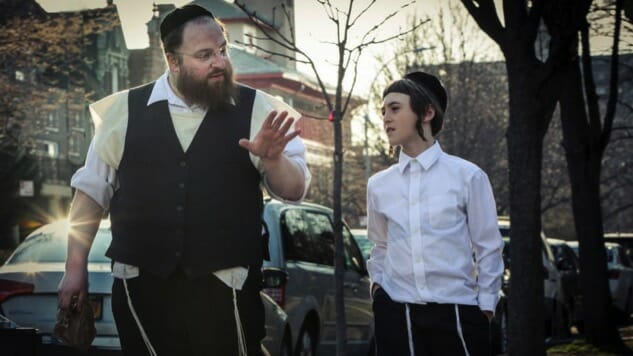Menashe

If you don’t get a single damn thing from the minutes sandwiched in between Menashe’s beginning and ending, then at least the beginning and ending tell you everything that you need to know: Conformity is a sacrifice.
You should, of course, get plenty from the rest of the film, regardless how close you are or aren’t to Orthodox Judaism. Like the Coen brothers’ A Serious Man, proximity to the culture is less important than basic human decency and empathy for people who don’t have full control of their own lives. Menashe, the title character, played by Youtube comic Menashe Lustig, instantly reads as sympathetic, well-intended, kindly and most of all, fatherly to his son. After the death of his wife, Menashe has flown solo as a parent, pressured by his community to remarry and by his unforgiving brother-in-law to let the boy stay with him. (The community, it’s worth noting, is on the side of the brother-in-law on that matter.) Centrally, Menashe engages that struggle, which just so happens to be the same struggle Lustig faces in his actual life.
It’s fine if you don’t know much about Hasidic Jewish society. It’s fine if you’re surprised to hear about the roadblocks director Joshua Z. Weinstein dealt with, trying to film Menashe in New Square, a Hasidic district nestled within the bosom of Brooklyn. These are immaterial. You only need to understand that Menashe is a father who believes he knows best, and believes he is fit to rear his own kid, and also that the world he inhabits disagrees. If the particulars that define Menashe’s turmoil stem directly from his culture, then the turmoil itself remains familiar, but do make an effort at engaging with that culture as Weinstein has done: It’s the least you can do, and frankly you don’t have much of a choice. Menashe’s spoken dialogue is mostly Yiddish.
But the language is, in part, what makes Menashe such a special experience, though. We’ve all watched films made in languages other than our own, whether French, Japanese, Spanish, British English, Japanese, German; the sensation of not apprehending what’s being said on screen sans the aid of subtitles isn’t new. New is hearing a cast of actors recite Ashkenazic dialect. Depending on where you live, Menashe might be the first time you’ve been fully exposed to it, which is just my coy way of saying that if you can see Menashe, see Menashe.
-

-

-

-

-

-

-

-

-

-

-

-

-

-

-

-

-

-

-

-

-

-

-

-

-

-

-

-

-

-

-

-

-

-

-

-

-

-

-

-








































